AARP Hearing Center
Home & Living
Worry, Sadness and Moments of Joy:
Stories From the Aftermath of Hurricane Milton
Older adults are often hit harder by natural disasters. Hurricane Milton was no different
By Susan B. Barnes, AARP
Published October 17, 2024
Two hurricanes just a week apart left older adults in Florida reeling, vulnerable and asking, "What now?" As many take stock of the damage to their houses and businesses and think over if they want to rebuild or move on, these are their stories. Some of them are tales of fear and frustration. But others highlight moments of joy amid the rubble - neighbors helping neighbors with kayaks to escape the flooding and shared coffee and food so everyone is strong enough to take the next step - whatever that might be. Text has been edited for length and clarity.
Zippy Sandler, a 70-year-old content creator, and her husband, Alan, 72, have lived in their home in Fort Pierce on Florida’s east coast for eight years.
My husband and I had an argument about the hurricane shutters. He said, “It’s a pain in the neck.” Thank goodness we got them up.
All of a sudden, it got very dark. The first thing I felt was the pressure – an intense version of when you’re in the plane and lose altitude and your ears hurt. And the rumble – it was like a train coming through the house.
It felt like the Wizard of Oz, the house shaking felt like it was coming off the foundation, and it’s a concrete block house. You could feel the walls suck in. Then I hear the crash – the whole back of my house is glass. The pressure caused by the tornado sucked the glass into the house. The glass is flying all over them (Alan and our dog, Baby). Alan just got out of the hospital; he was on a ventilator – he couldn’t get up fast enough.
We barricaded in our master bedroom and waited for the hurricane.
People tell you afterwards, “Call the insurance company. Take a lot of photos. Document everything.” But there’s no cell or WIFI. And “Make sure you’re safe.” I don’t know what that means. Does that mean water and plumbing? Cleaning up the glass in the dark? I’m 70 years old. How do I do this?
People are going house to house offering their services, like ‘I’ll tarp your roof for $3,000.’ It’s like you get both ends – people trying to rip you off as they’re walking around, and community of volunteers who are there to help.
Annika Sandstrom, 75, of Sarasota, Florida, immigrated to the U.S. from Sweden in 1986. She owns a boutique called Olivia in St. Armands Circle, which was devastated by Hurricanes Helene and Milton.
The day after [Hurricane Helene], we walked in over-knee-high water to look at what happened. It looked like a big lake. We wanted to cry. We couldn’t open the door to my boutique because then even more water would flood in.
And then Hurricane Milton hit.
And that was the wind. Whatever was saved was ruined by the wind. The sign I’ve had for 37 years – we were so proud of that sign. It’s sad to see this wonderful shopping center … it’s mostly privately-owned businesses, small mom and pop stores, and we have a lot of nice restaurants that people come from all over to visit and enjoy.
I was shocked when this happened after living here 37 years and not really experiencing anything even close to this.
John Russo, 70, moved to South Florida just over a year ago from New York. He prepared for Hurricane Milton with a generator, plenty of food, and hurricane-rated doors and windows. Russo was about to take his dog, Buckwheat, outside when a tornado swept through Wellington.
I was going to walk out the door. I saw the pool cage fly away. I didn't open up the door, I just stood there near the door. And then the tornado was gone. Literally, two seconds. I didn't have a chance to run into any room. I didn't even hear it.
Mo Chiodini, 64, of Davis Island (just south of Tampa) is an assistant professor of exercise science at the University of South Florida and has lived in her home for 20 years. She took out a seven month lease on an apartment so she has a place to live while she waits to find out if she can rebuild.
Helene was September 26. I remember that because it's my mother's birthday. I stayed for Helene thinking I was ready. I didn't really realize what 5 to 8 feet of [storm] surge actually meant. I had barriers for my doors and I was ready. In fact, most of my neighbors were here.
I'm watching and 8:30 at night it's no rain, hardly any wind. All of a sudden, my street started to flood. And then it came up my driveway faster than I've ever seen water come up my driveway. Then it came through my garage, into my kitchen.
I have my dog, Abby. I have a life jacket for her. By now I have water above my knees in my house and I had the handle of her life jacket and she's swimming. We go onto the porch and I'm getting hit by lumber because of all the new houses being constructed.
I hear my friend, "Wait for me – I’m coming!" I look up and there's a big spotlight and he's in a kayak coming down from my neighbor's house. By then the water was up to my chest.
About 7:30 the next morning I got up and walked home, and I was still in water up to my knees. Anything that wasn't above about 30 inches in my house was gone.
Emily Rogers, 57, an independent contractor, has lived in her neighborhood just north of downtown Tampa for nearly 20 years. She decided to get a hotel about seven miles inland with her dog Venus during Hurricane Milton and is now staying with one of her nearby Alpha Kappa Alpha sorority sisters "who's like family."
The initial call I got overnight was from my security company calling to say that the fire alarm was going off and if I wanted to get the fire department dispatched. Unfortunately, they called back to say because of the storm, they weren't able to go to dispatch because it wasn't safe for them.
There were so many neighbors on the ground, and I found out later that they got hoses to try to save [the house]. As soon as it was light, I got in the car and just drove with my hazard lights on to get to the house, and of course it was gone.
Neighbor after neighbor came out. They brought me coffee. They brought snacks for Venus. They brought food because of course I hadn't eaten breakfast. They brought lunch. They brought apples, grapes, strawberries, water. They were just coming out, person after person after person after person. I've lived [here] since the mid-2000s. And so it's home – Tampa is home.
As the president of Tack N Rider, an equestrian shop in Wellington that's been there for a decade, Prashant Ramani, 54, has felt the impact of Hurricanes Helene and Milton on small businesses.
Every day matters in a [small] business. It does make a difference. These [hurricanes] are part and parcel of living in South Florida. You gotta be prepared for it, so we just take it as a part of business. We take the regular precautions; we knew that we were going to get some wind and rain.
Jennifer Wheaton, 55, moved from Boston to Jupiter, Florida to be closer to her mother, 78, who lives about an hour north in Vero Beach.
I wanted my mom to come down here, but she felt that she was safe up in the Vero Beach area. But knowing that my mom's in a closet in a beach chair is not very settling.
I moved down here to be closer to her. She was getting older, and I wanted to be able to be there to support her during these things. Had the hurricane taken a little bit of a turn, I probably would have been up there because she didn't want to come down here. And you find that a lot of older people, they don't want to leave their households.
Carol Orler, 78, was at a car show in Biloxi, Mississippi when Hurricane Milton hit Bradenton, her home on Florida’s west coast since the 1950s. In addition to worrying about her family (children, grandchildren, brother), she was concerned about her home.
[After the hurricane] I started crying because of the suspense of waiting to see what happened, and we weren’t here to do anything. Not being here was just as frightening to me because I’m a worrywart. And when I saw how bad it was, it was stressful, very stressful. You could feel it in your body; it’s like you were tightly wound. And the thing was, I could not help anybody.
Lovingly called “Mama” by her fellow disaster volunteers at World Central Kitchen (WCK), Tampa native Fannie Buie, 66, is no stranger to disaster. She has been traveling with WCK’s mobile food kitchen for the past three years.
I’m just feeding people for the hurricane. I don’t have any lights or nothing like that, but I’m still working. My lights went out early that Thursday – I haven’t even been there [Tampa] because I’ve been on the road helping feeding.
Bob Kirkland, 82, his wife Sharon, 82 and their dog Charley live in Manaplan in Palm Beach County on Florida's southeast coast. One of the main reasons they chose to shelter in place: their pup.
I am not going to leave my dog chained on a fence like someone apparently did. And the waters did rise.
Susan B. Barnes is a Florida-based independent journalist with a passion for travel, wellness and the environment.
Jayme Kaye Gershen, Zippy Sandler, Lexi Critchett, Emily Rogers, Tina Russell and Octavio Jones also contributed to this piece.




























































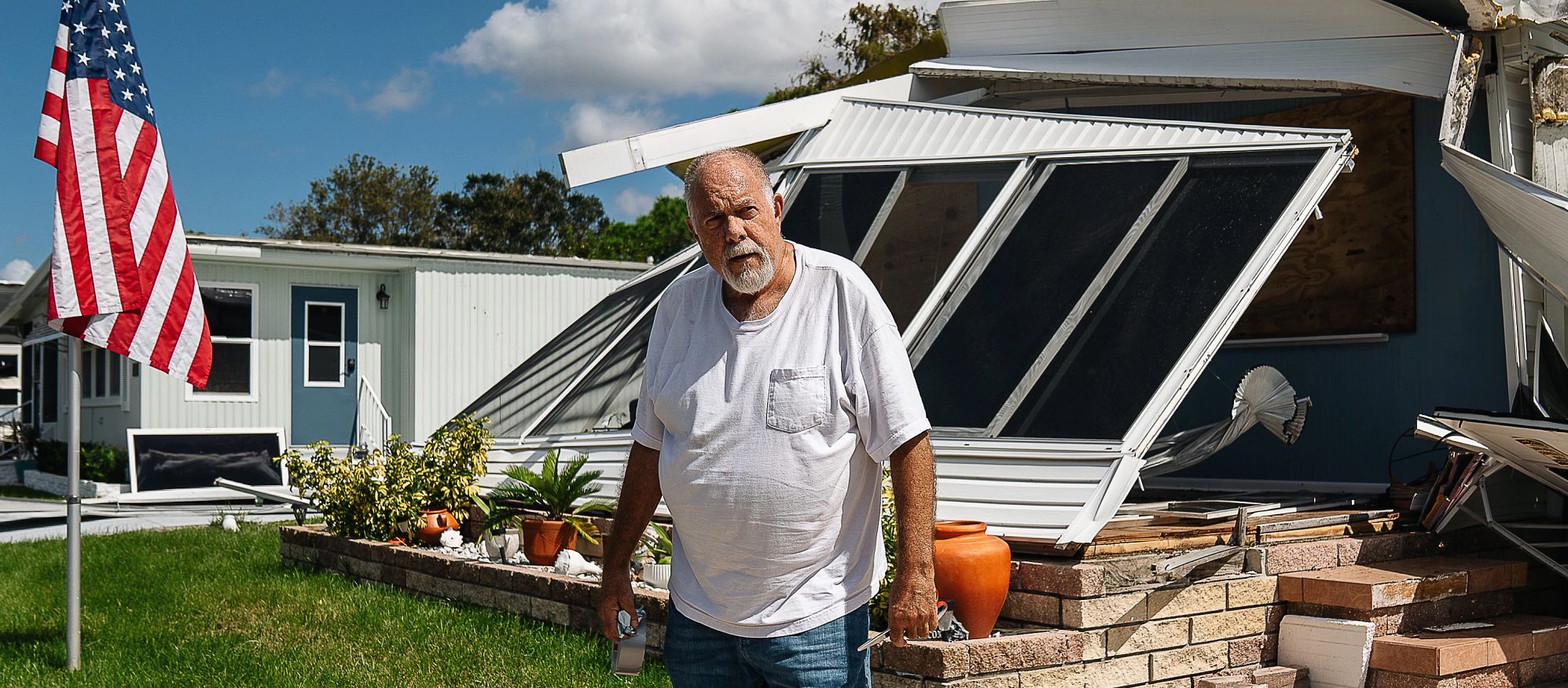
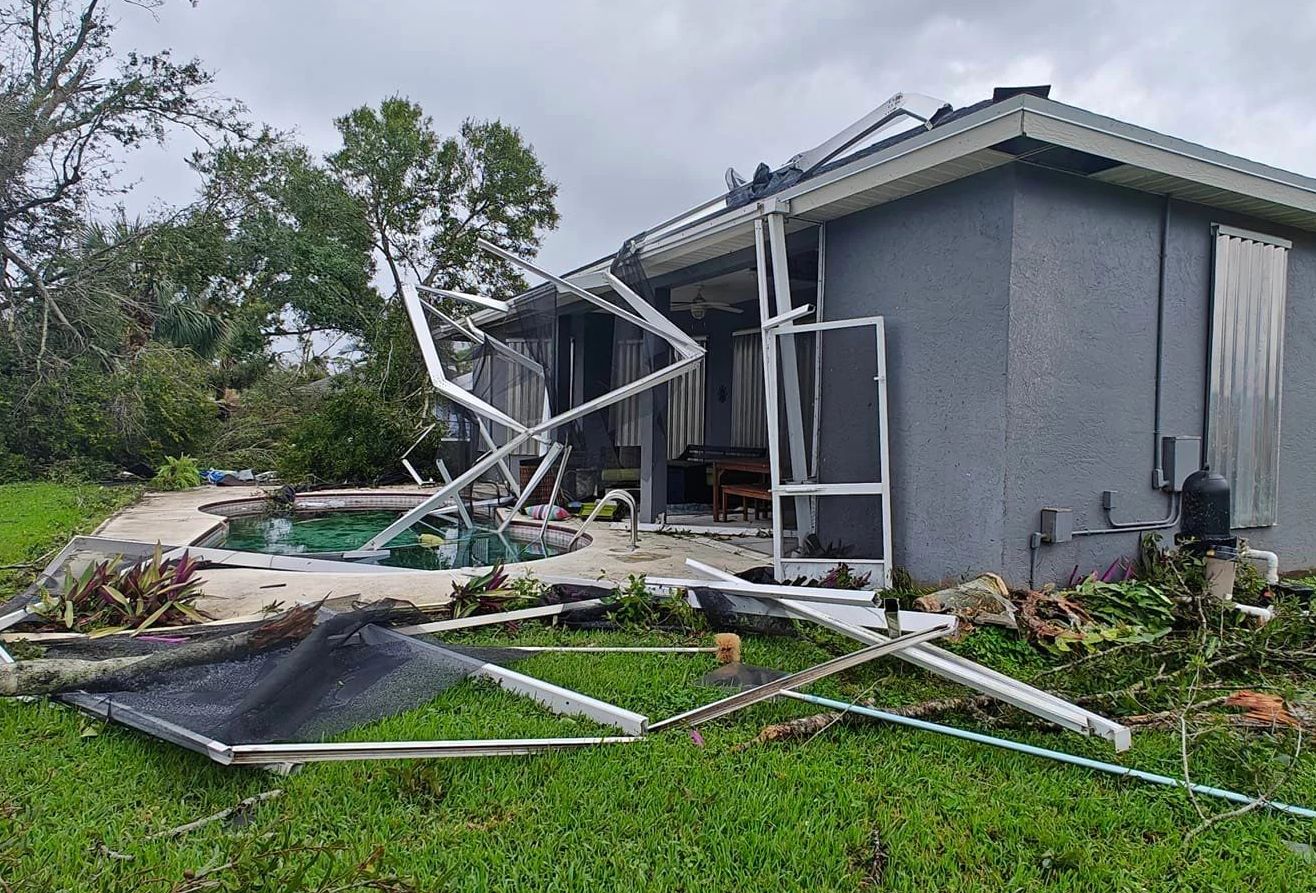


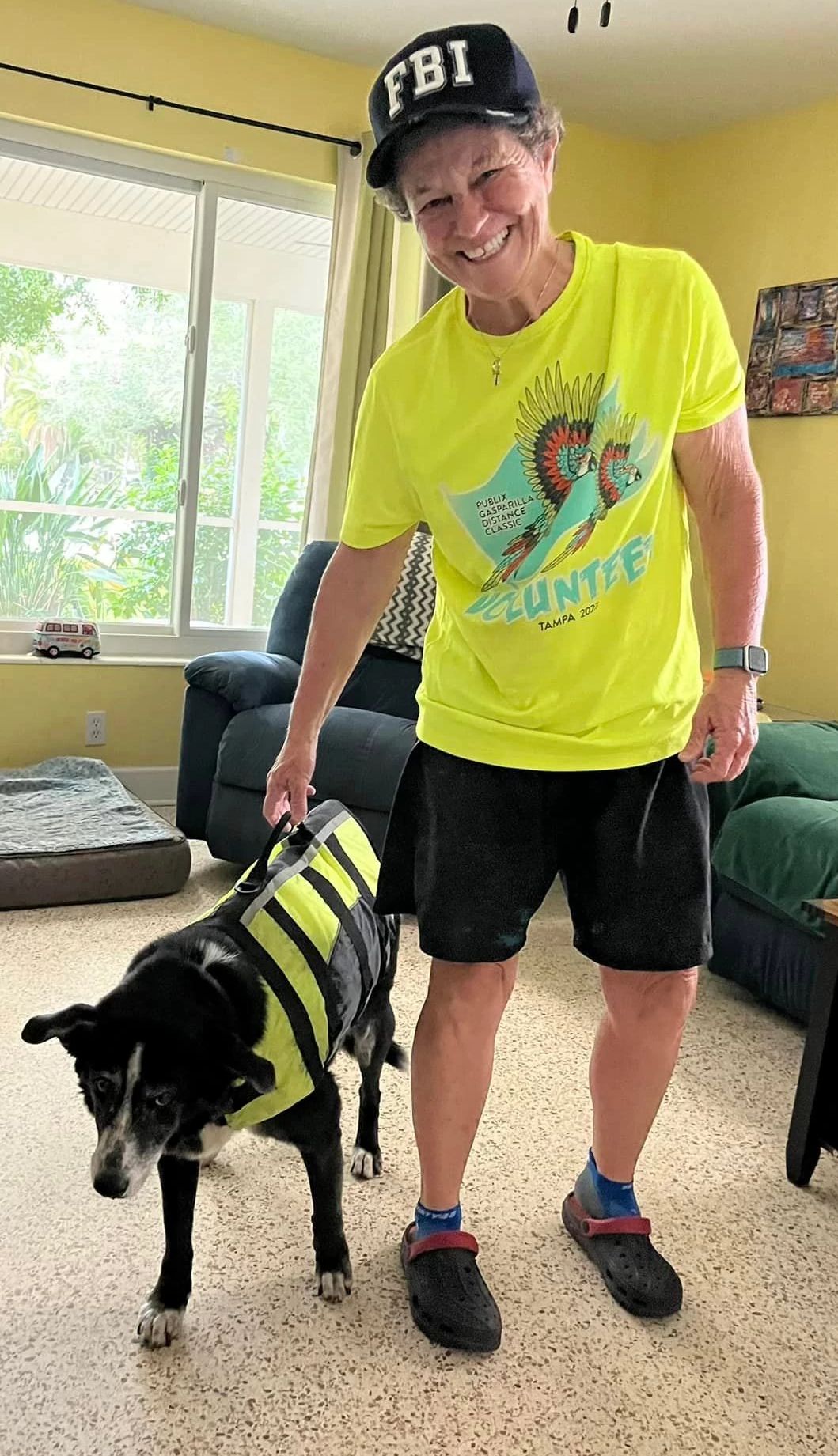
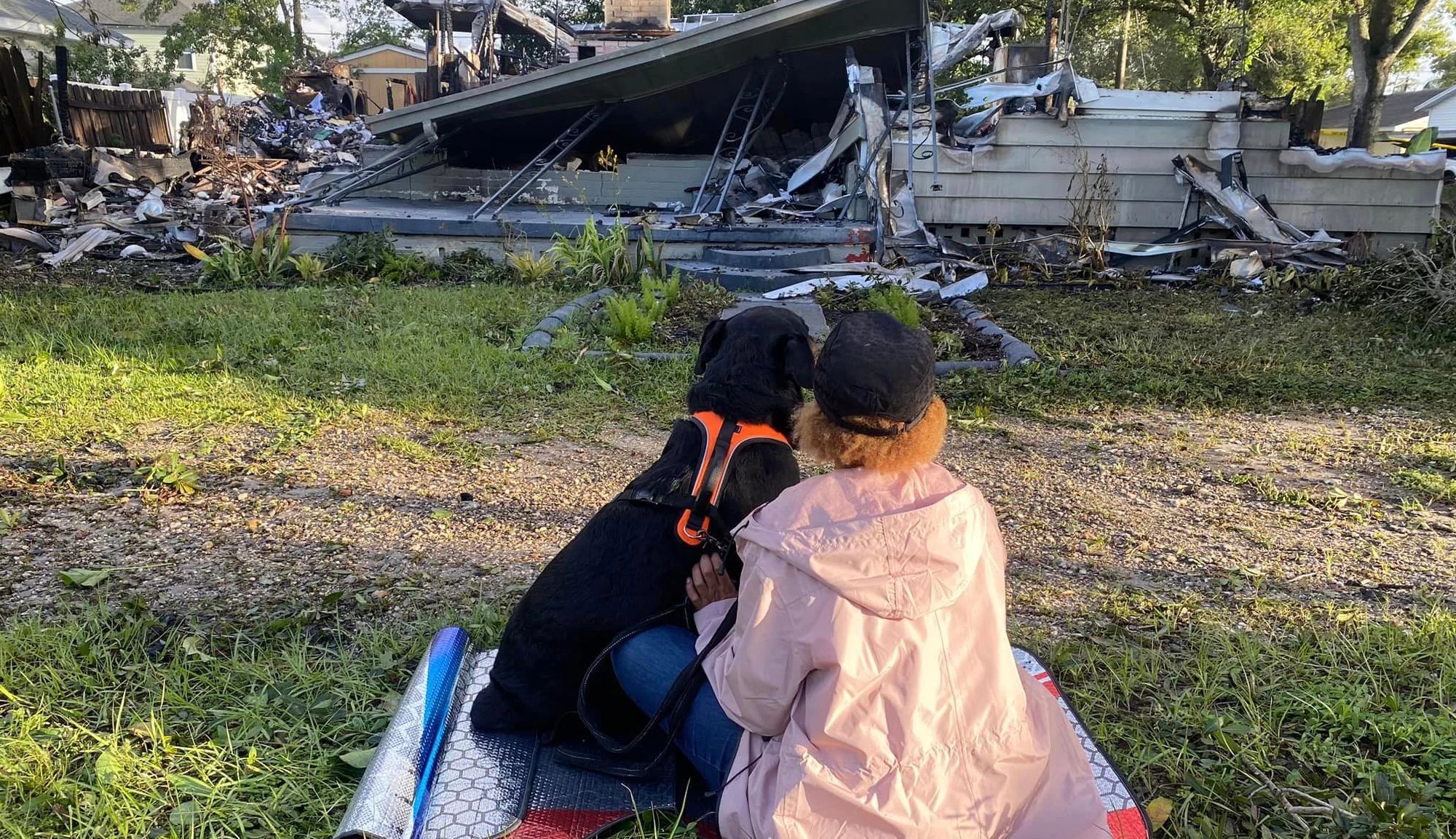


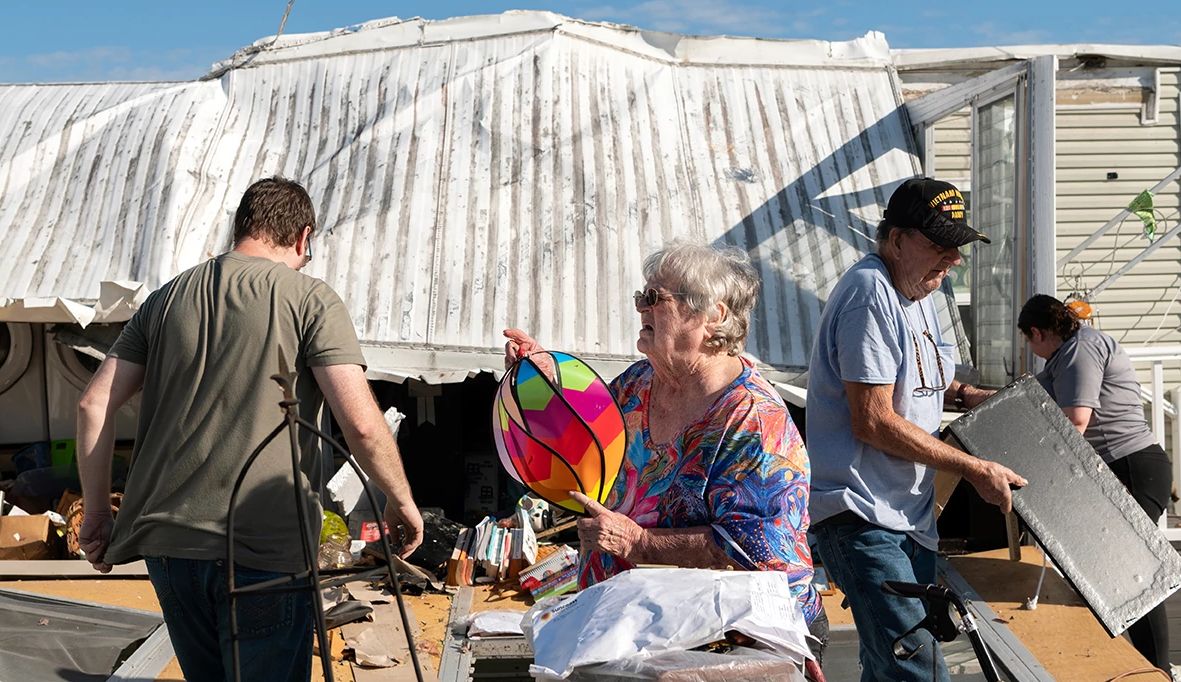
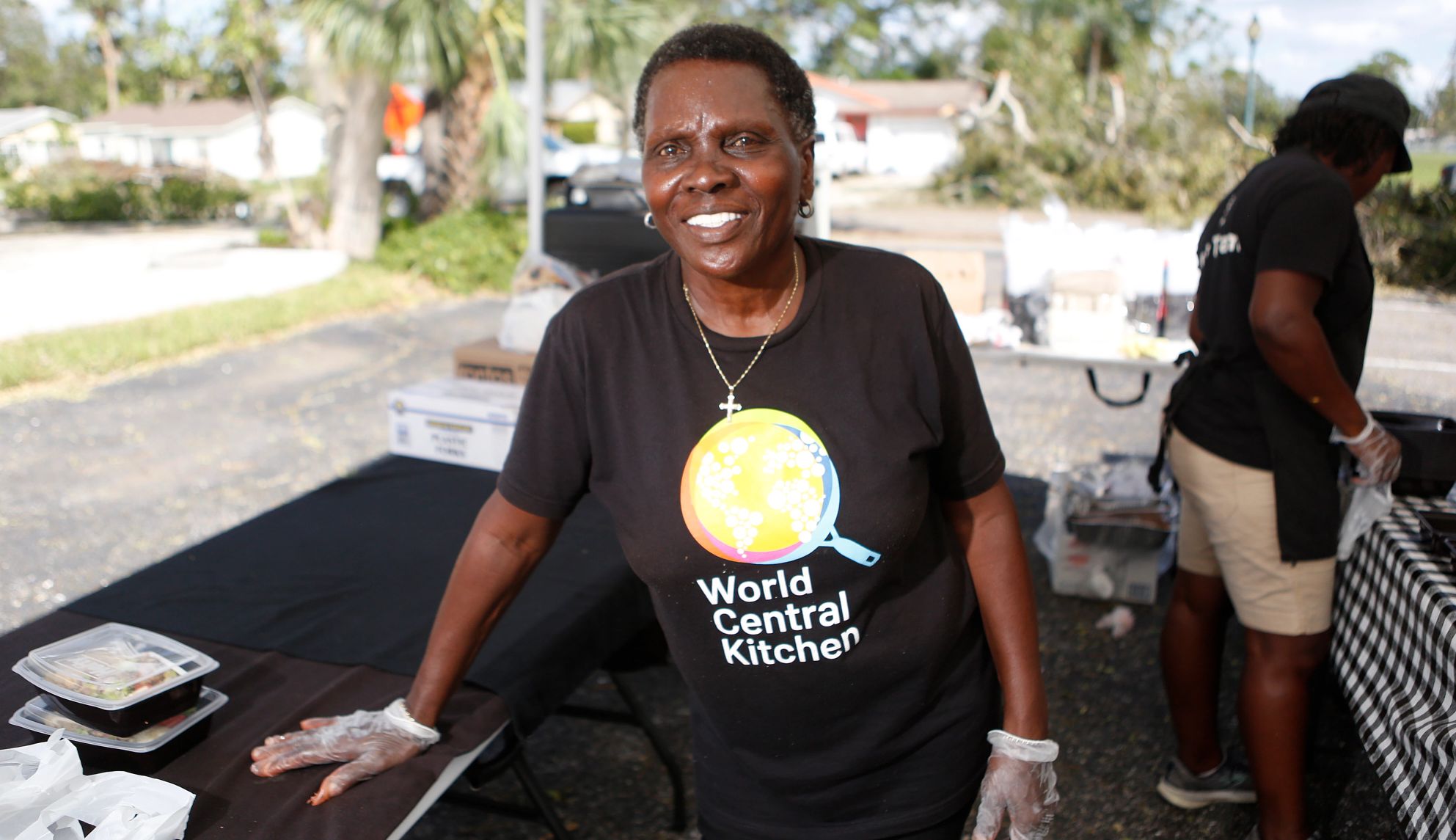

Resources For You
Avoid Disaster Fraud and FEMA Scams
Scammers may pose as contractors, FEMA officials and other personnel
Be Prepared for Natural Disasters
Review our resources to be ready before they strike
How to Recover from a Natural Disaster
Tips for making a comeback from the unavoidable
AARP Foundation Relief Fund to Help Hurricane Victims
Money will go to communities recovering from storms
Recommended for You